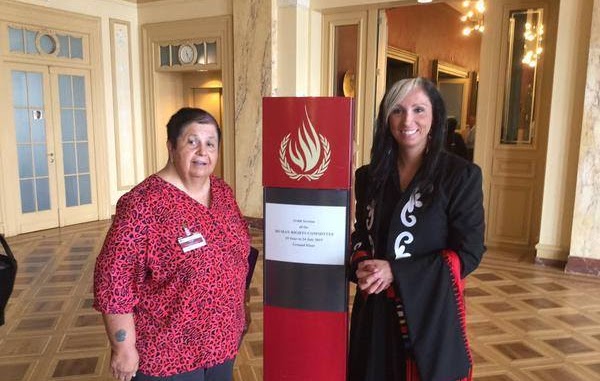Sharon McIvor has won yet another landmark legal victory for First Nations women — this time at the United Nations Human Rights Committee (UNHRC). On January 14, 2019, the UNHRC released their decision which found that Canada still discriminates against “Indian” women and their descendants in the registration provisions of the Indian Act. Despite the fact that Sharon had already proven her discrimination case at trial and on appeal here in Canada, the federal government refused to eliminate all the remaining sex discrimination from the Act. This meant that Sharon and her descendants still have lesser or no Indian status as compared to her brother and his descendants — simply based on sex. Sharon was therefore forced to bring a human rights claim to the UNHRC under the Optional Protocol to the International Covenant on Civil and Political Rights (ICCPR). The UNHRC found Canada had violated Sharon’s human rights and directed Canada to provide an effective remedy for Sharon McIvor, her descendants, and others who have suffered the same discrimination.
It is important to note that Canada is bound by this decision. The ICCPR came into force for Canada on August 19, 1976 and Canada has agreed to be bound by the jurisdiction of the UNHRC to make decisions on matters coming before it. This means that Canada has chosen to be bound by the rights contained within this Covenant for the benefits of all those in Canada. In this case, the UNHRC found that Canada had violated Sharon’s human rights under Articles 3 and 26, read in conjunction with Article 27 of the ICCPR.
Article 3 guarantees the equal right of men and women to enjoy the rights contained in the ICCPR. Article 26 provides that all people are equal under the law and specifically prohibits discrimination on the basis of race, sex, birth or other status. These two articles were considered in conjunction with Article 27 which provides that ethnic minorities within States shall not be denied their right to enjoy their culture in community with other members of their group. The UNHRC found that Canada had violated Sharon’s rights under all three articles and directed Canada to do make “full reparation” to Sharon, her descendants and others in her position. Canada was directed to:
1. Register all those like Sharon and her descendants, under Section 6(1)(a) of the Indian Act;
2. Take steps to clean up any residual discrimination within First Nation communities arising from sex discrimination in the Indian Act; and
3. Take any additional steps necessary to avoid similar violations in the future.
The federal government has been given 180 days to inform the UNHRC about how it will implement this decision. The good news is that the federal government has the capacity to comply with the first part of the decision this month. The federal government already drafted amendments to the Indian Act’s registration provisions in Bill S-3 that would remove the remaining sex discrimination raised by Sharon McIvor’s case. The problem is that Parliament didn’t enact those provisions into force. While all the other amendments contained within Bill S-3 were brought into force in 2018, they purposely left our remedy for sex equality for “someday” — a hypothetical right that we can only hope is fulfilled someday. First Nations women deserve better than this.
While the Indian Act’s registration provisions have a long, complicated history, and the various amendments made over time, including Bills C-31, C-3 and the most recent S-3 have created a complex mess of criteria almost impossible to understand; the core issue is simple. Indian women who married non-Indians and their descendants have lesser or no status compared to Indian men who married non-Indians and their descendants. Sex discrimination in federal legislation, like the Indian Act, is against Canadian law as well as international human rights laws to which Canada has agreed to be bound. There is simply no legal justification for continuing to deny the basic right of sex equality to First Nation women and children. To do so makes the federal government an outlaw — both in Canada and internationally.
The question now is whether the self-professed “feminist” Prime Minister Justin Trudeau and his Liberal government will abide by the UNHRC decision or continue to violate the core human rights of First Nations women and children. Reconciliation with First Nations demands immediate implementation of this decision, but the Liberal (and Conservative) record is very poor when it comes to respecting the human rights of First Nations women. They have the power to do it — but it always has been, and always will be, a matter of political will.
Sharon has sacrificed more than 33 years to this battle to protect the rights of First Nation women and our children. It is because of Sharon that I have a political voice as a First Nations woman. Implementing this decision will not only mean that my children will finally be able to be registered and included as members of my First Nation, but Sharon and I, and thousands of others like us, will finally be treated equally with our First Nation brothers.
Canada cannot claim to stand as a champion of human rights in the global context while continuing to deny First Nations women and children basic human rights. Reconciliation requires shedding the hypocritical rhetoric and taking action to do what is morally right and legally required.
The world is watching Canada.
Link to the UNHRC decision:
https://tbinternet.ohchr.org/Treaties/CCPR/Shared%20Documents/CAN/CCPR_C_124_D_2020_2010_28073_E.pdf
Link to CBC article about the case:
https://www.cbc.ca/news/indigenous/indian-act-sex-discrimination-un-committee-1.4982330
Dr. Pamela D. Palmater is a Mi’kmaw lawyer and member of the Eel River Bar First Nation in New Brunswick. She teaches Indigenous law, politics and governance at Ryerson University and heads Ryerson’s Centre for Indigenous Governance.
Photo courtesy of Pamela Palmater.
Help make rabble sustainable. Please consider supporting our work with a monthly donation. Support rabble.ca today for as little as $1 per month!




